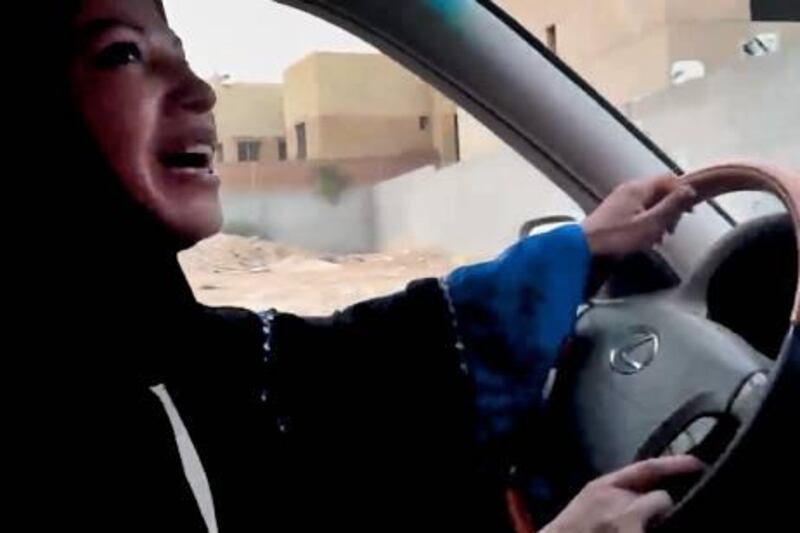RIYADH // All her friends told Maha al Qahtani not to do it. They warned her it would be bad if she got caught.
But the 39-year-old mother of two decided it was time to make a stand. So she packed her toothbrush, a comfortable nightgown and her prayer mat - just in case she was arrested. And, dressed in her black abaya and a full face veil, she slipped behind the wheel of her family's shiny blue Hummer H3.
With her supportive husband in the passenger seat and this reporter in the back seat, Mrs al Qahtani went for a half-hour drive in Riyadh yesterday as part of a national campaign by Saudi women to pressure the government to lift the ban on female drivers.
"We have to make our point that it's our right [to drive] and they should respect that," said Mrs al Qahtani.
Since it was Friday morning, the streets were mostly deserted. Mrs al Qahtani said she wasn't nervous but let out a quick "Oh my God" when a police car quickly passed her vehicle. Two other traffic police cars sighted on the brief excursion either did not see Mrs al Qahtani driving or chose to ignore her. Mrs al Qahtani was one of at least 40 women who reported, mainly through Twitter, that they had driven by late afternoon. That unofficial count was likely to rise, but it seemed clear the campaign would not elicit a mass drive-out as organisers had hoped.
Nevertheless, the campaign, launched last March, is a marker in some respects. It is perhaps the largest and most genuinely grass-roots campaign by Saudi women to demand a change in the restrictions on their independence and mobility.
Under the guardianship system in force here, women need permission from their father, husband or brother to marry, travel outside the country, work outside the home, and have certain kinds of medical procedures.
Although women are not banned from driving by law, they are not allowed to drive under a long-held social custom. Many top government officials, including King Abdullah bin Abdul Aziz, reportedly have no objection to women driving. But they are reluctant to upset hardline conservatives, both men and women, who believe that women driving is the first step on a slippery slope to losing the Islamic identity of their society.
The idea behind yesterday's campaign is that women should go out and drive en masse in order to persuade the government to allow women to choose to drive or not. Women were advised not to gather in one place so as not to violate the ban on demonstrations.
The traffic police seem to have taken a low-key approach to the driving protest. They were not patrolling in greater numbers than usual. One arrest was noted on Twitter.
When Mrs al Qahtani was stopped by police during a second drive with her husband later in the day, she was issued a ticket for not having a Saudi driver's license. Normally, women caught violating the driving ban, are held by police until their male guardian picks them up and signs a pledge that the woman will not drive again.
But last month, in a move that scared many women who were contemplating joining the driving campaign, the government detained one of its organisers for nine days. Manal al Sharif, 32, was arrested after posting to YouTube a video of herself driving as a way to encourage women to join the campaign.
According to Saudi sources, she was released on orders of King Abdullah, who is seen as a strong supporter of women's rights.
The businesswoman Sabah al Mustafa, who owns a photographic studio, said she drove twice yesterday in the eastern city of Qatif - once to the grocery store and once to her relatives' home. Her husband accompanied her. She learned to drive in Britain and has a driver's license from there.
"As a working woman, I know what women need," said Mrs al Mustafa, who noted the tremendous inconvenience of having to depend on drivers or male relatives to get around.
A university student in her late 20s was perhaps the first person to drive in yesterday's campaign. With her husband videotaping her, she drove in Riyadh a little past midnight. The couple later posted the evidence on YouTube.
"I look forward for the day that all of this becomes as natural as men driving," she said in an e-mail later, asking for anonymity as she was nervous about how her extended family might view her driving adventure.
For all the novelty of women driving yesterday, one thing remained eternal, at least in the al Qahtani family vehicle: husband was unable to resist giving instructions to wife.
"Slow down!" said Mohammad al Qahtani. "Move into the right lane." "Watch out!" "OK, OK," replied Mrs al Qahtani. "When I was learning to drive," she recalled, "he drove me nuts. Each time we would fight ... so I decided to learn with somebody else."
cmurphy@thenational.ae





